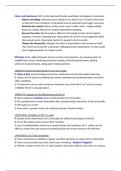Summary
Summary AQA A level Psychology paper 1, topic memory, lesson - improving eyewitness testimony / the cognitive interview
- Module
- Memory (PSYCH101)
- Institution
- AQA
This is a document of revision notes on the cognitive interview for the topic of memory in paper 1 AQA A level psychology. This follows the AQA specification.
[Show more]



